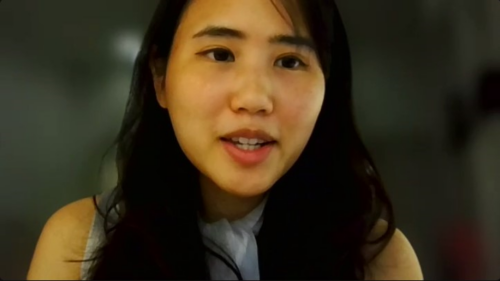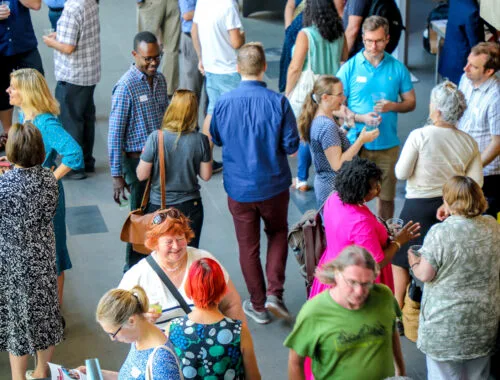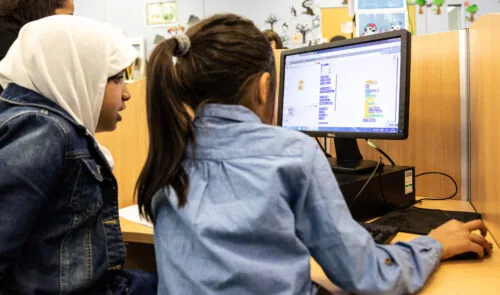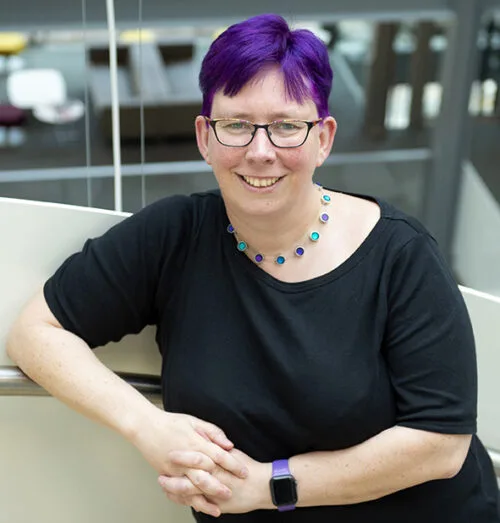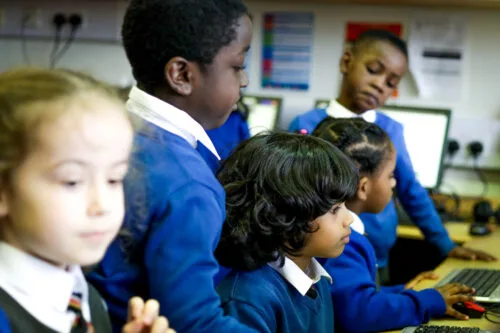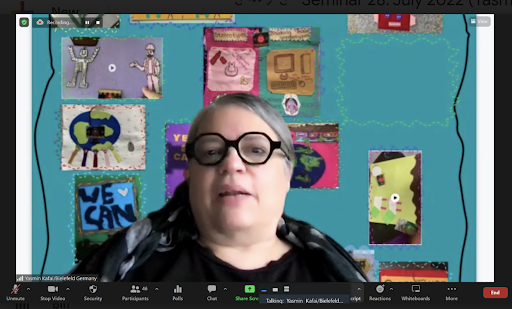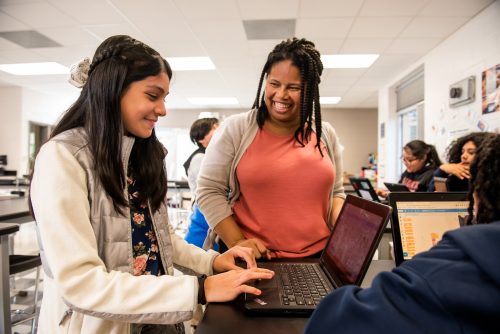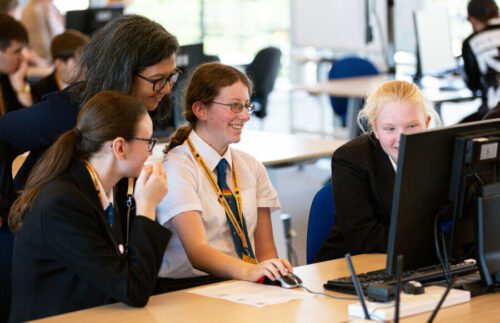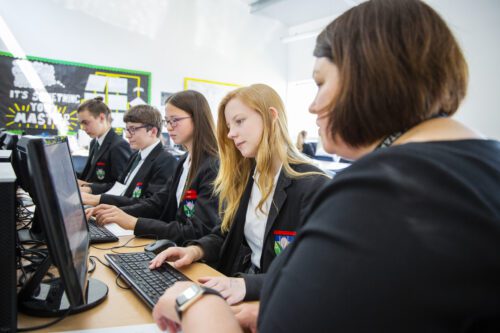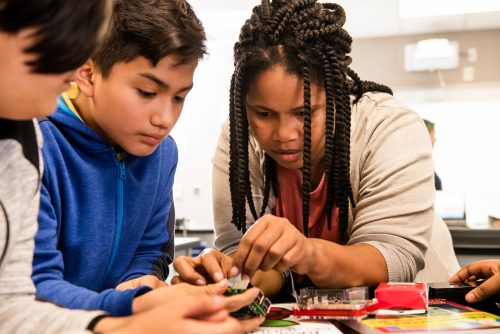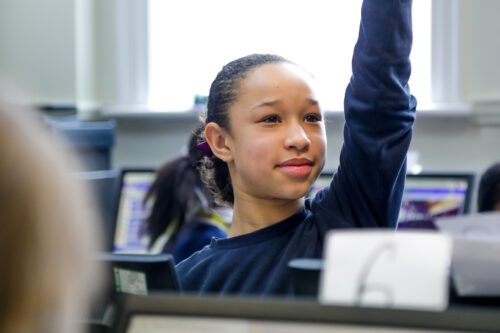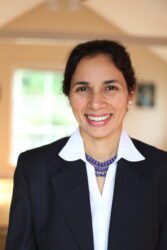Schlagwort: research seminar
-

Young children’s ScratchJr coding projects: Assessment and support
Reading Time: 5 minutesBlock-based programming applications like Scratch and ScratchJr provide millions of children with an introduction to programming; they are a fun and accessible way for beginners to explore programming concepts and start making with code. ScratchJr, in particular, is designed specifically for children between the ages of 5 and 7, enabling them to…
-

Apply for a free UK teacher’s place at the WiPSCE conference
Reading Time: 3 minutesFrom 27 to 29 September 2023, we and the University of Cambridge are hosting the WiPSCE International Workshop on Primary and Secondary Computing Education Research for educators and researchers. This year, this annual conference will take place at Robinson College in Cambridge. We’re inviting all UK-based teachers of computing subjects to apply…
-

Running a workshop with teachers to create culturally relevant Computing lessons
Reading Time: 6 minutesWho chooses to study Computing? In England, data from GCSE and A level Computer Science entries in 2019 shows that the answer is complex. Black Caribbean students were one of the most underrepresented groups in the subject, while pupils from other ethnic backgrounds, such as White British, Chinese, and Asian Indian, were…
-

Introducing data science concepts and skills to primary school learners
Reading Time: 5 minutesEvery day, most of us both consume and create data. For example, we interpret data from weather forecasts to predict our chances of a good weather for a special occasion, and we create data as our carbon footprint leaves a trail of energy consumption information behind us. Data is important in our…
-

Integrating primary computing and literacy through multimodal storytelling
Reading Time: 5 minutesBroadening participation and finding new entry points for young people to engage with computing is part of how we pursue our mission here at the Raspberry Pi Foundation. It was also the focus of our March online seminar, led by our own Dr Bobby Whyte. In this third seminar of our series…
-

Combining computing and maths to teach primary learners about variables
Reading Time: 5 minutesIn our first seminar of 2023, we were delighted to welcome Dr Katie Rich and Carla Strickland. They spoke to us about teaching the programming construct of variables in Grade 3 and 4 (age 8 to 10). Dr Katie Rich Carla Strickland We are hearing from a diverse range of speakers in…
-

Gender Balance in Computing — the big picture
Reading Time: 7 minutesImproving gender balance in computing is part of our work to ensure equitable learning opportunities for all young people. Our Gender Balance in Computing (GBIC) research programme has been the largest effort to date to explore ways to encourage more girls and young women to engage with Computing. Commissioned by the Department…
-

Combining research and practice to evaluate and improve computing education in non-formal settings
Reading Time: 7 minutesIn the final seminar in our series on cross-disciplinary computing, Dr Tracy Gardner and Rebecca Franks, who work here at the Foundation, described the framework underpinning the Foundation’s non-formal learning pathways. They also shared insights from our recently published literature review about the impact that non-formal computing education has on learners. Dr…
-

Spotlight on primary computing education in our 2023 seminar series
Reading Time: 4 minutesWe are excited to announce our next free online seminars, running monthly from January 2023 and focusing on primary school (K–5) teaching and learning of computing. Our seminars, having covered various topics in computing education over the last three years, will now offer you a close look at current questions and research…
-

Building a maths curriculum for a world shaped by computing
Reading Time: 5 minutesIn the penultimate seminar in our series on cross-disciplinary computing, we were delighted to host Conrad Wolfram (European co-founder/CEO of Wolfram Research). Conrad Wolfram Conrad has been an influential figure in the areas of AI, data science, and computation for over 30 years. The company he co-founded, Wolfram Research, develops computational technologies…
-

Data ethics for computing education through ballet and biometrics
Reading Time: 6 minutesFor our seminar series on cross-disciplinary computing, it was a delight to host Genevieve Smith-Nunes this September. Her research work involving ballet and augmented reality was a perfect fit for our theme. Genevieve Smith-Nunes Genevieve has a background in classical ballet and was also a computing teacher for several years before starting…
-

Using e-textiles to deliver equitable computing lessons and broaden participation
Reading Time: 5 minutesIn our current series of research seminars, we are exploring how computing can be connected to other subjects using cross-disciplinary approaches. In July 2022, our speakers were Professor Yasmin Kafai from the University of Pennsylvania and Elaine Griggs, an award-winning teacher from Pembroke High School, Massachusetts, and we heard about their use…
-

Are you technocentric? Shifting from technology to people
Reading Time: 7 minutesWhen we teach children and young people about computing, do we consider how the subject has developed over time, how it relates to our students’ lives, and importantly, what our values are? Professor Pratim Sengupta shared some of the research he and his colleagues have been working on related to these questions…
-

A pair programming approach for engaging girls in the Computing classroom: Study results
Reading Time: 10 minutesToday we share the second report in our series of findings from the Gender Balance in Computing research programme, which we’ve been running as part of the National Centre for Computing Education and with various partners. In this £2.4 million research programme, funded by the Department for Education in England, we aim…
-

Join us at the launch event of the Raspberry Pi Computing Education Research Centre
Reading Time: 4 minutesLast summer, the Raspberry Pi Foundation and the University of Cambridge Department of Computer Science and Technology created a new research centre focusing on computing education research for young people in both formal and non-formal education. The Raspberry Pi Computing Education Research Centre is an exciting venture through which we aim to…
-

A teaspoon of computing in every subject: Broadening participation in computer science
Reading Time: 6 minutesFrom May to November 2022, our seminars focus on the theme of cross-disciplinary computing. Through this seminar series, we want to explore the intersections and interactions of computing with all aspects of learning and life, and think about how they can help us teach young people. We were delighted to welcome Prof.…
-

A storytelling approach for engaging girls in the Computing classroom: Pilot study results
Reading Time: 7 minutesWe’ve been running the Gender Balance in Computing programme of research since 2019, as part of the National Centre for Computing Education (NCCE) and with various partners. It’s a £2.4 million research programme funded by the Department for Education in England that aims to identify ways to encourage more girls and young…
-

AI literacy research: Children and families working together around smart devices
Reading Time: 6 minutesBetween September 2021 and March 2022, we’ve been partnering with The Alan Turing Institute to host a series of free research seminars about how to young people about AI and data science. In the final seminar of the series, we were excited to hear from Stefania Druga from the University of Washington,…
-

Exploring cross-disciplinary computing education in our new seminar series
Reading Time: 5 minutesWe are delighted to launch our next series of free online seminars, this time on the topic of cross-disciplinary computing, running monthly from May to November 2022. As always, our seminars are for all researchers, educators, and anyone else interested in research related to computing education. Crossing disciplinary boundaries What do we…
-

170 research papers about teaching programming, summarised
Reading Time: 3 minutesComputer programming is now part of the school curriculum in England and many other countries. Although not necessarily the primary focus of the computing curriculum, programming can be the area teachers find most challenging to teach. There is much evidence emerging from research on how to teach programming, particularly from projects with…
-

Linking AI education to meaningful projects
Reading Time: 6 minutesOur seminars in this series on AI and data science education, co-hosted with The Alan Turing Institute, have been covering a range of different topics and perspectives. This month was no exception. We were delighted to be able to host Tara Chklovski, CEO of Technovation, whose presentation was called ‘Teaching youth to…
-

The AI4K12 project: Big ideas for AI education
Reading Time: 7 minutesWhat is AI thinking? What concepts should we introduce to young people related to AI, including machine learning (ML), and data science? Should we teach with a glass-box or an opaque-box approach? These are the questions we’ve been grappling with since we started our online research seminar series on AI education at…
